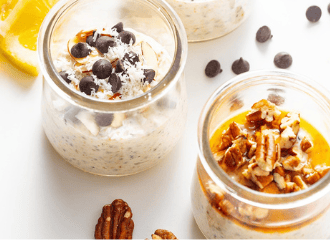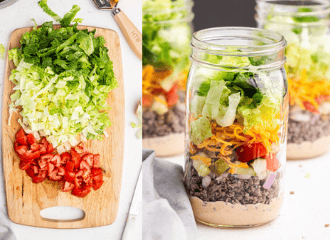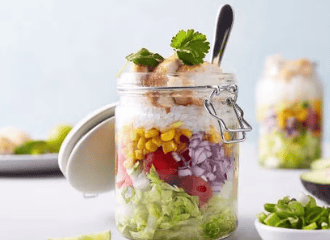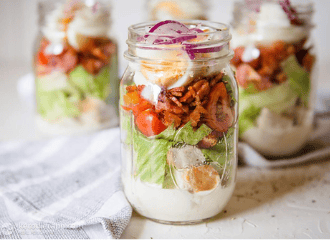- Prediabetes Mastermind
- Posts
- Stop guessing what's spiking your blood sugar - track it instead
Stop guessing what's spiking your blood sugar - track it instead
PLUS best apps to use guide
Welcome back, health champions!👋
Are you gaining weight even when you try to eat healthy? Do you crash around 3 PM every day? Do you eat well for days, then suddenly eat everything in sight and feel guilty about it?
You're not alone. Today, we'll show you one simple tool that can help: meal tracking.
What's inside:
Easy meal prep recipes
Why tracking your food works better than guessing
The best apps to use
How to track without going crazy
A fun 21-day challenge you can do with others
BEST FINDS
These mason jar meals are portion-controlled, photo-ready, and ideal for consistent logging. Morning Energy Boosters: Keto Overnight Oats - No morning blood sugar spikes here!; Low Carb Mason Jar Omelettes - Protein-packed and ready in 60 seconds; Lunch Winners That Travel: Big Mac Salad in a Jar - All the flavor, none of the carb crash; Low Carb Burrito Jars - Mexican flavors without the tortilla guilt; Taco Mason Jar Salad - Crunch stays fresh, energy stays steady; Low-Carb Cobb Salad in a Jar - Classic comfort, modern convenience
Tracking Tip: Mason jar meals make portion control easy and photo logging effortless. Prep Sunday, track all week! 📸
Meal Tracking for Prediabetics
When "Healthy" Eating Feels Confusing
Some days your energy crashes after lunch. Other days you wonder why that "healthy" smoothie made you hungrier. You've been gaining weight even though you're trying to eat right. You eat perfectly for days, then suddenly you can't stop eating.
You're not imagining this. What feels like you're failing is actually prediabetes messing with your blood sugar. This makes you confused about what to eat and when.
Here's the problem: Your body isn't handling sugar as well as it used to, but you don't have full diabetes yet. You're stuck in the middle where normal diet advice doesn't work well.
The solution? When you and your doctor have real information about what you eat, how you feel, and how your body reacts, these confusing symptoms start to make sense.
Why Tracking Beats Guessing
The science is clear - writing down what you eat turns guesswork into useful information. Research shows:
You eat less sugar without trying:
When people write down what they eat, they naturally cut back on sugar without even thinking about it. Studies show that people who track their meals consistently eat 15-30 grams less added sugar per day—that's like skipping sugar in 6-8 chocolate chip cookies. One recent study found people cut 16 grams of sugar daily just from logging their food, with no special diet rules required.
You naturally eat smaller portions
Just writing down your food makes you eat 10% fewer calories without trying to restrict yourself.
Better healthcare visits
Your doctor/diabetes educators/dietitians can give you better advice when they see what you actually eat instead of trying to remember.
Early warning system
Weight gain and bad eating habits happen slowly. Food logs show these problems weeks or months before they become obvious.
Your Hormones Matter
Most tracking advice ignores this: your monthly cycle affects your hunger, mood and blood sugar. The same meal can impact you differently depending on where you are in your cycle. Tracking helps you see these patterns.
Choosing the Right Tools for Managing Prediabetes
The meal-tracking landscape offers numerous options, each with distinct advantages for managing prediabetes.
See our comprehensive comparison guide below for detailed features, costs, and pros/cons of the most popular tracking tools.
|
What to Track Beyond Calories
Balance Your Food Groups
Track carbs, protein, and fat—not just calories. Aim for 20-25% protein with balanced carbs and fats. This helps keep your blood sugar steady all day long.
When and Why You Eat
Write down when you eat plus other things like: stress levels, how well you slept, and where you are in your monthly cycle. These things really affect your blood sugar. You'll start to see patterns that help you predict and prevent blood sugar spikes.
Focus on Fiber
Track fiber specifically—aim for 25-30 grams daily. High-fiber foods slow down sugar absorption and help your body handle insulin better. Think beans, berries, and vegetables with every meal.
Avoiding Common Mistakes
Common problems that make people quit:
All-or-nothing thinking → giving up after missing one meal
Wrong portion sizes → guessing serving sizes wrong
Only focusing on carbs → ignoring other nutrients that affect blood sugar
Forgetting snacks → missing small bites that add up
App overload → getting tired of tracking
Being mean to yourself → turning logs into self-criticism
Solutions That Work
The 80% Rule Try to track most meals, not every single thing. An almost-complete log still shows useful patterns.
Smart Shortcuts
Save frequent meals as favorites
Take photos of all your meals, add details later
Weigh food for one week, then use your eyes to estimate
Weekly Check-ins
Every Sunday, find: your biggest blood sugar spike, your biggest win, and one thing to improve next week.
Kind Language
Say "flex meal" instead of "cheat meal" and "learning moment" instead of "bad choice." How you talk to yourself matters.
Use Technology
If you have a blood sugar monitor, mark when you eat to see how foods affect you. Smart scales can sync your weight with various apps.
Join Our Free Community Challenge!

Ready to change your eating habits with support from others? Join our double challenge:
📸 Daily Meal Photo Challenge — Share meal photos daily for 21 days. Breakfast wins, lunch experiments, dinner successes—we want to see it all!
🥘 Meal Prep Master Challenge — Post your weekly meal prep setup. Batch cooking, organized containers, prep day magic—show us your systems!
Challenges start next Thursday, July 10th ! Free to join! Sign-up here.
Making It Work in Real Life
Start Small
Track just dinner for one week, then slowly add other meals. This prevents overwhelm and builds habits that research shows last long-term.
Get Support
Share weekly progress, creative ideas, and wins with family, coworkers, or online groups. Research shows women with supportive networks are much more likely to stick with healthy changes.
The Bottom Line
Meal tracking for prediabetes isn't about being perfect. It's about becoming aware so you can make better choices and control your blood sugar. Start with just one meal today and build from there. Your steady efforts now can greatly reduce your risk of getting type 2 diabetes and help you feel more energetic and in control of your health.

How did you like today’s newsletter? |

THAT’S A WRAP
[All original research data maintained but served with extra purpose ✨]
Here's to your health,
Ava
from Prediabetes Mastermind






